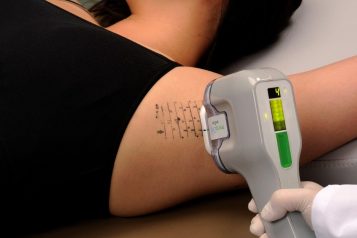As a facial plastic surgeon, specializing in hair loss, I see a lot of women with the concern of losing their hair. Hair loss, particularly in women, can be quite burdening. The most common cause for hair loss in women as in men is due to genetics (what we inherit from either our mother or father’s side). Women may experience hair loss for other reasons such as hormonal changes (for instance, hair loss seen after pregnancy). Yet other— albeit very rare causes of hair loss in women—are immunological which can result in various types of alopecias. If you are concerned about hair loss, it is best to be seen by a hair loss specialist who can obtain a medical history and examination to help ascertain the cause for the hair loss. In many cases, women have different options in helping to slow down the progressive nature of the hair loss and they may be candidates for a hair transplant.
Topical treatments
Topical remedies exist for women suffering from hair loss. The most commonly used treatment and the most proven is topical minoxidil. Women can use minoxidil in either the 2% or the 5% foam formulation. For the best results, it needs to be applied to the scalp twice daily. Although many complain of the nuisance in the application of minoxidil, it can be very effective in helping to thicken existing hair and slow down the progression of hair loss.
Low level laser light therapy
Low level laser light therapy is a treatment option which received FDA clearance for safety in 2007. The use of light therapy for hair loss has been known for decades but most recently it has become a practical and effective means for treating hair loss. Low level laser light is essentially used to stimulate the weakened hair follicles to help thicken hair. Hair undergoes a process known as miniaturization before it is shed and lost. The process of miniaturization is why patients suffering from hair loss often feel that their hair quality has changed and become “finer or thinner.” Low level laser light is now an effective treatment option for most women suffering from hair loss. It is a small device worn under a cap, fitted to the scalp, which can be worn at home. The treatment entails the use of the device for about 30 minutes three times per week. These devices can be found in physician offices specializing in hair loss.
Platelet-rich plasma
In some cases, women may be candidates for platelet rich plasma therapy (PRP). PRP uses the cells and the growth factors from your own body to help stimulate the growth of hair follicles in the scalp. It is a procedure whereby a small amount of your blood is drawn and processed to isolate the plasma rich in growth factors. Early scientific studies show promising results with this therapy.
Hair transplant
Hair transplant is an option for some women with hair loss to help restore volume to the hair. Candidacy for a hair transplant is determined by a hair restoration specialist. Hair is typically taken from the back and sides of the scalp and replaced into the areas of the scalp that have experienced the most hair loss. It is a meticulous procedure where individual hair follicles are transplanted in the scalp. It can help to restore volume and minimize the appearance of the scalp. Hair transplantation is often performed in combination with the other the medical modalities mentioned.
To schedule a consult, contact Dr. Anthony Bared Facial Plastic Surgery Miami.
For more information, visit Dr. Brian A. Levine's social media:


























